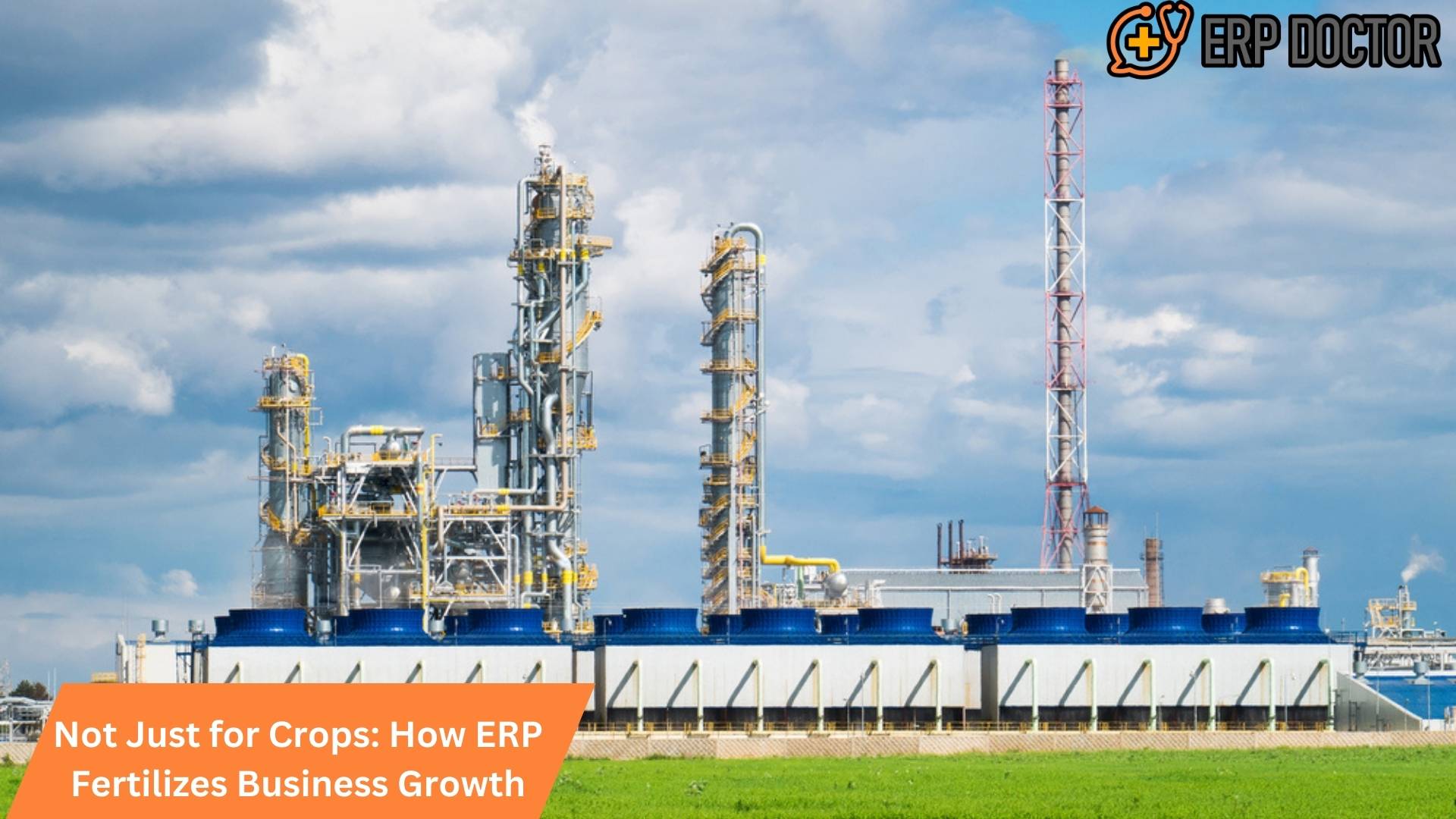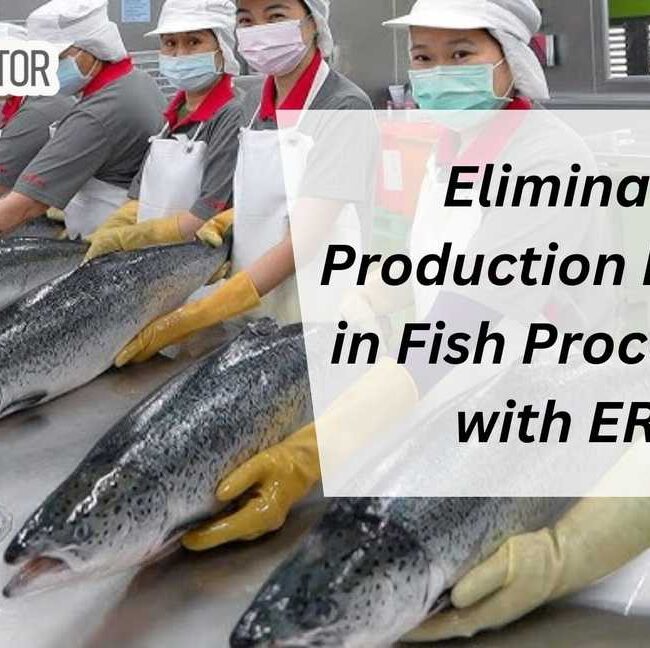
Not Just for Crops: How ERP Fertilizes Business Growth

How ERP is Cultivating Growth in the Fertilizer Industry
The fertilizer industry plays a crucial role in ensuring global food security, but operational challenges like fluctuating raw material costs, compliance regulations, and supply chain inefficiencies can hinder profitability. This is where ERP (Enterprise Resource Planning) solutions step in, revolutionizing the fertilizer sector with automation, data-driven insights, and process optimization. Let’s explore how ERP is not just for managing crops—it’s fertilizing business growth.
The Role of ERP in the Fertilizer Industry
1. Streamlining Supply Chain & Inventory Management
A robust ERP system ensures real-time tracking of raw materials, production, and distribution. With advanced inventory forecasting, fertilizer manufacturers can avoid overstocking or stockouts, optimizing operational costs.
Additionally, ERP provides greater visibility into the entire supply chain, helping businesses manage supplier relationships more effectively. Automated alerts notify procurement teams about low stock levels or delivery delays, ensuring smooth operations. By integrating ERP with IoT technology, fertilizer companies can track shipments in real time, reducing lead times and improving logistics efficiency.
2. Regulatory Compliance Made Easy
The fertilizer industry faces strict regulations regarding chemical composition, safety, and environmental impact. ERP software automates compliance reporting, tracks raw materials, and ensures adherence to global and local regulatory standards.
With built-in compliance management features, ERP helps businesses maintain a digital record of quality control measures, hazardous material handling, and safety data sheets (SDS). This reduces the risk of non-compliance penalties and enhances trust with stakeholders. Automated audit trails and document management also streamline regulatory inspections, making compliance easier and more efficient.
3. Enhancing Production Efficiency
By integrating ERP, fertilizer companies can optimize batch production, monitor equipment performance, and reduce downtime. Predictive maintenance features also help avoid unexpected disruptions in the production process.
ERP systems enable manufacturers to analyze production trends and adjust their processes accordingly. With real-time monitoring, companies can detect inefficiencies, such as bottlenecks in production lines or excessive energy consumption. Additionally, ERP-powered automation reduces human error and ensures that each batch meets industry quality standards, resulting in higher product consistency and reduced waste.
4. Cost Optimization and Profitability
ERP solutions provide in-depth cost analysis, helping fertilizer manufacturers manage expenses on raw materials, labor, and logistics. Accurate pricing models enable businesses to maintain competitive pricing while improving margins.
Cost control features within ERP allow businesses to track and analyze expenditures at every stage of production. From procurement to packaging, ERP software identifies areas where costs can be minimized without compromising quality. Advanced financial modules also assist in budgeting, forecasting, and profitability analysis, enabling businesses to make data-driven pricing decisions that enhance revenue growth.
5. Data-Driven Decision Making
With real-time analytics and reporting, ERP empowers business leaders with valuable insights into demand forecasting, customer preferences, and financial performance, helping fertilizer companies stay ahead in the competitive market.
ERP dashboards consolidate data from multiple departments, offering a centralized platform for executives to monitor key performance indicators (KPIs). By leveraging AI-powered analytics, fertilizer companies can anticipate market trends, optimize production schedules, and make proactive decisions that drive long-term business success. Decision-makers can also access real-time reports on mobile devices, ensuring flexibility and responsiveness in dynamic market conditions.
6. Better Customer Relationship Management (CRM)
Integrating CRM with ERP ensures seamless customer communication, better order tracking, and improved customer satisfaction, ultimately driving brand loyalty in the fertilizer market.
With an ERP-integrated CRM, sales teams can track customer interactions, manage orders, and provide timely support. Automated invoicing and order fulfillment reduce delays, ensuring that customers receive their products on time. Additionally, ERP enables personalized marketing campaigns based on customer purchase history and preferences, strengthening relationships and boosting retention rates.
7. Sustainable & Eco-Friendly Practices
With growing environmental concerns, ERP solutions help fertilizer businesses adopt sustainable practices by reducing waste, optimizing resource utilization, and tracking carbon footprints.
ERP systems support green initiatives by monitoring energy consumption, managing waste disposal, and optimizing resource allocation. Businesses can set sustainability goals, track their progress, and implement eco-friendly manufacturing processes, such as using renewable energy sources or reducing chemical emissions. By aligning operations with sustainability standards, fertilizer companies can enhance their corporate social responsibility (CSR) reputation and meet consumer demand for environmentally responsible products.
8. Scalability & Future Growth
As demand for fertilizers grows globally, ERP allows businesses to scale operations efficiently. Cloud-based ERP ensures seamless expansion across multiple locations without infrastructure constraints.
Scalability is essential for fertilizer businesses looking to expand their market reach. Cloud-based ERP systems offer flexibility, allowing companies to add new production sites, warehouses, and distribution channels with minimal disruption. ERP also facilitates global trade by managing currency exchange rates, international shipping regulations, and cross-border compliance requirements. As businesses grow, ERP ensures operational consistency and agility, supporting long-term success in the ever-evolving fertilizer industry.
ERP is no longer just a tool for managing business operations; it’s a game-changer for the fertilizer industry. From compliance management to predictive analytics, ERP ensures efficiency, profitability, and sustainability. Implementing the right ERP system can propel fertilizer businesses toward exponential growth in a highly competitive landscape.
FAQs
1. How does ERP improve fertilizer production efficiency?
ERP streamlines batch production, automates quality checks, and schedules predictive maintenance, reducing downtime and boosting efficiency.
2. Can ERP help fertilizer businesses with regulatory compliance?
Yes, ERP automates compliance reporting, tracks chemical compositions, and ensures adherence to industry regulations.
3. What supply chain benefits does ERP provide for fertilizer manufacturers?
ERP offers real-time inventory tracking, demand forecasting, and optimized logistics, reducing operational costs.
4. How does ERP contribute to sustainability in the fertilizer industry?
ERP tracks carbon footprints, optimizes resource utilization, and reduces waste, promoting eco-friendly manufacturing.
5. Can small-scale fertilizer businesses benefit from ERP?
Yes, cloud-based ERP solutions provide scalability and affordability, making them ideal for small and mid-sized businesses.
6. How does ERP improve customer service in the fertilizer industry?
ERP integrates CRM, automates order tracking, and provides real-time updates, ensuring better customer satisfaction.
7. What cost-saving features does ERP offer for fertilizer companies?
ERP enables precise cost analysis, helps manage raw material expenses, and optimizes pricing models.
8. Is ERP necessary for fertilizer companies with multiple locations?
Yes, ERP centralizes data across locations, ensuring smooth coordination and uniform business operations.
9. How does ERP enhance decision-making for fertilizer businesses?
ERP provides real-time analytics, helping leaders make data-driven decisions for better productivity and profitability.
10. What are the key features to look for in an ERP system for the fertilizer industry?
Look for features like batch production management, regulatory compliance tracking, inventory forecasting, and CRM integration.
By leveraging ERP, fertilizer businesses can maximize efficiency, maintain compliance, and drive long-term profitability. Now is the time to embrace digital transformation and watch your business grow!







